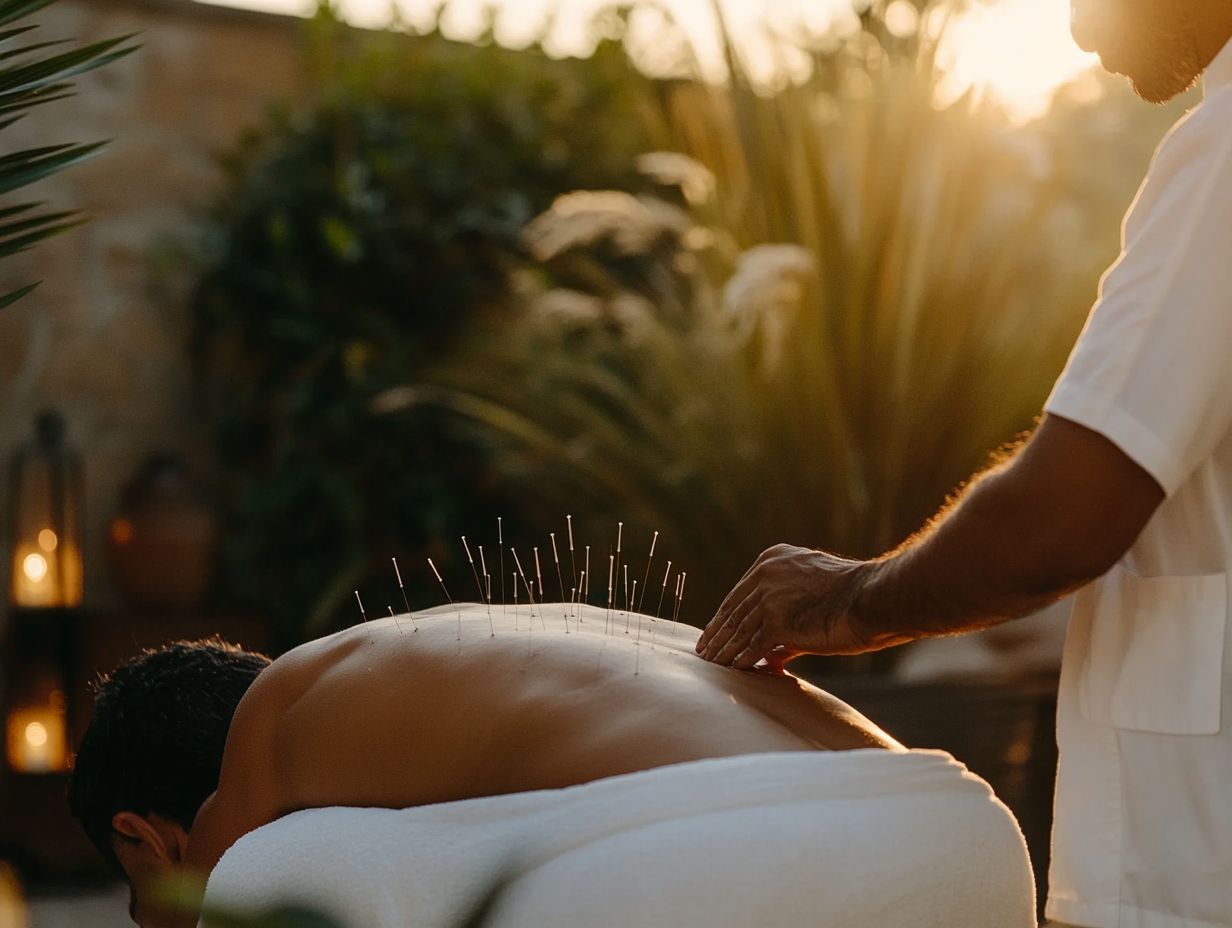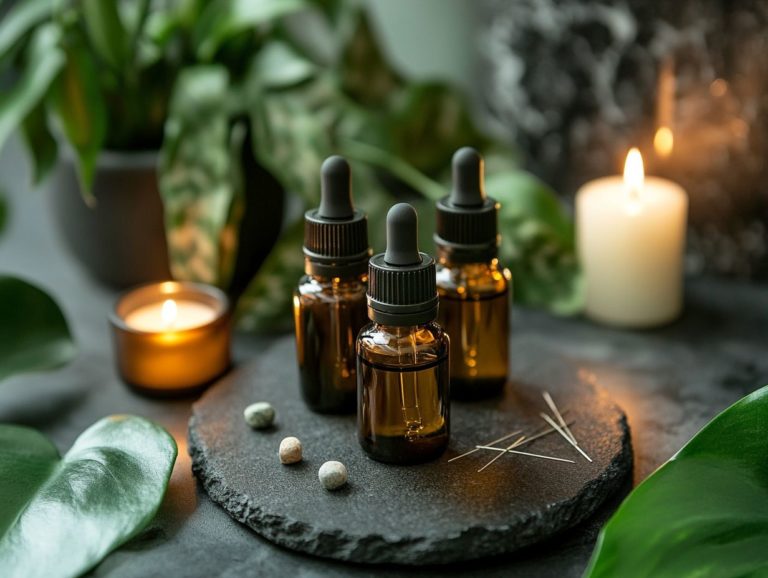The Basics of Acupuncture: What You Need to Know
Acupuncture, a time-honored practice deeply rooted in Traditional Chinese Medicine, has captured attention across the globe for its holistic approach to well-being.
This exploration delves into the rich history and origins of acupuncture, illuminating its core principles and techniques. You ll discover the wide array of conditions it can effectively address and the numerous benefits it offers for both physical and mental health. You ll also gain insights into what to expect during a session.
You will also find guidance on selecting the right acupuncturist for your needs. Uncover how this ancient therapy can elevate your overall health and wellness.
Contents
Key Takeaways:

Acupuncture is an ancient practice that involves inserting thin needles into specific points on the body to stimulate healing and balance. The principles and techniques of acupuncture are based on the concept of Qi, pronounced ‘chee,’ which is considered the life force that flows through the body. Acupuncture can help treat a variety of physical and mental health conditions.
When preparing for an acupuncture session, it is important to communicate openly with your acupuncturist and choose a qualified and reputable practitioner for the best results.
What is Acupuncture?
Acupuncture is a refined holistic healing practice grounded in traditional Chinese medicine (TCM). It involves the skillful insertion of fine needles into precise acupuncture points along the body s meridians, promoting the flow of qi, or life energy.
This ancient art is carefully designed to restore balance and enhance overall health, treating many physical and emotional issues. Exploring acupuncture can transform your health!
History and Origins
The history of acupuncture stretches back thousands of years, with its origins firmly anchored in ancient China, where it emerged as a cornerstone of traditional Chinese medicine, focusing on the balance of qi within the body.
Over the centuries, this ancient practice has evolved significantly, adapting to various cultural contexts and medical paradigms. Influential figures like Huangdi, credited with the “Huangdi Neijing,” laid the foundational principles of acupuncture theory, while practitioners in later dynasties refined techniques and broadened its methodologies.
By the 20th century, research began to surface, demonstrating its effectiveness in pain management and facilitating its acceptance within Western medicine. Modern practitioners, including Helene M. Langevin, continue to delve into acupuncture’s relevance, bridging ancient wisdom and contemporary science, thereby reinforcing its legitimacy in today s healthcare landscape.
How Does Acupuncture Work?
Acupuncture operates by targeting specific points on your body, intricately linked through meridians. This practice stimulates the flow of qi, helping to restore energy balance and, in turn, promoting healing and alleviating pain.
Principles and Techniques
The principles of acupuncture are anchored in techniques that involve the precise application of needles at specific acupoints along the meridians. Complementary therapies, such as moxibustion, cupping, and Gua Sha, enhance the overall treatment outcomes.
These methods work synergistically to promote the flow of Qi, the body s vital energy. When you receive acupuncture, the needles stimulate your body s natural healing processes.
Moxibustion, which entails burning the herb mugwort near your skin, warms and invigorates the Qi flow. Cupping creates suction to relieve muscle tension and improve circulation, while Gua Sha, through gentle scraping of the skin, boosts blood flow and alleviates pain.
Together, these therapies address specific ailments while embracing a holistic approach to well-being, making them essential elements of traditional healing practices.
Conditions Treated with Acupuncture

Acupuncture is renowned for its effectiveness in addressing a wide range of medical conditions. From chronic pain and digestive troubles to muscle cramping and hormonal imbalances, this ancient practice not only alleviates symptoms but also enhances your body’s immune response and overall well-being.
Common Ailments and Symptoms
You can treat a variety of common ailments with acupuncture, including chronic pain, anxiety, depression, arthritis, and chronic inflammation. This makes acupuncture a highly effective complementary therapy for both pain relief and emotional well-being.
Many people notice significant improvements in their quality of life as acupuncture addresses not just physical discomfort but also emotional stressors. For instance, if you re dealing with chronic pain, regular sessions can help reduce your reliance on medication and enhance your mobility.
If anxiety and depression are weighing you down, acupuncture may provide the emotional stability and resilience you seek.
For conditions like arthritis and chronic inflammation, you can expect notable symptom relief, leading to greater joint flexibility and an uplifted mood. This multifaceted approach highlights acupuncture’s unique ability to cater to a wide range of symptoms, promoting holistic healing and rejuvenation throughout your experience.
Unlock the Incredible Benefits of Acupuncture!
Experience the amazing benefits of acupuncture that can transform your health, enhancing both physical and mental well-being.
This practice promotes relaxation and fosters overall wellness, establishing itself as an essential element of restorative medicine.
Physical and Mental Health Benefits
Acupuncture enhances your physical health by stimulating the release of chemicals in the brain that affect mood and pain, helping to alleviate discomfort and elevate your mood. This ultimately contributes to improved mental well-being.
Research provides compelling evidence to support these claims. For example, a study published in the Journal of Pain found that individuals who received acupuncture reported significant reductions in chronic pain symptoms.
Endorphins, often referred to as the body’s natural painkillers, play a crucial role in this therapeutic approach. They bind to opioid receptors, producing feelings of euphoria that enhance your overall experience.
Case studies involving patients diagnosed with anxiety disorders have shown remarkable improvements in their mental health following treatment, highlighting acupuncture’s holistic benefits.
By understanding these findings, you can truly appreciate how acupuncture connects physical pain relief and mental health enhancement through biochemistry.
Preparing for an Acupuncture Session
Preparing for your acupuncture session means getting familiar with what to expect. You’ll want to understand the role of the practitioner, the ambiance of the setting, and key steps that can elevate your overall experience.
What to Expect and How to Prepare

During a session, expect a tranquil environment where the practitioner skillfully applies needles to targeted areas. Minor side effects, such as slight bruising, may occur but are generally negligible.
The atmosphere is usually serene, enhanced by soft lighting and calming music that helps alleviate stress. As the session unfolds, you may experience sensations ranging from gentle tingling to a profound sense of relaxation, indicating your body’s positive response to the treatment.
It’s crucial to communicate openly with your practitioner about these sensations to ensure they can tailor the experience to your comfort level. While potential side effects are usually minimal, some individuals may encounter dizziness or fatigue.
To maximize the benefits of your session, staying hydrated and allowing yourself to rest afterward can help mitigate any lingering effects.
Choosing an Acupuncturist
Selecting an acupuncturist is a pivotal step in your healing journey. Thoughtful consideration of several key factors, including their qualifications, experience, and the specific treatments they provide, is essential.
Ready to start your acupuncture journey? Book a session today to feel the difference!
Factors to Consider and Questions to Ask
When selecting an acupuncture practitioner, consider their qualifications and treatment philosophy. This will help create a nurturing healing environment.
Verify that the practitioner has the appropriate certifications to ensure they meet industry standards. Look for their areas of specialization; some may focus on pain management while others excel in fertility or stress relief.
Patient reviews can provide insights into their effectiveness and bedside manner. Think about asking questions such as:
- “What techniques do you primarily use?”
- “How do you tailor treatments to individual needs?”
This dialogue builds trust and clarity, making your healing journey more personalized.
Frequently Asked Questions
What is acupuncture and how does it work?
Discover the ancient art of acupuncture, a unique approach to wellness rooted in traditional Chinese medicine. It involves inserting thin needles into specific body points, believed to correspond to energy channels called meridians.
By stimulating these points, acupuncture aims to restore balance and promote healing.
What conditions can acupuncture treat?

Acupuncture can treat a variety of conditions, including:
- Chronic pain
- Stress
- Digestive issues
- Respiratory problems
- Allergies
- Headaches
- Infertility
Is acupuncture safe?
When performed by a licensed practitioner, acupuncture is generally safe. Sterile, disposable needles minimize the risk of infection. Like any treatment, it may have side effects, such as bruising or minor bleeding.
What should I expect during an acupuncture session?
In your session, the practitioner will discuss your health concerns. They will then insert thin needles into specific points, targeting areas related to your condition.
You may feel a slight sensation, but acupuncture is typically not painful. The needles will remain for 15-30 minutes, during which you can relax.
How many acupuncture sessions do I need?
The number of sessions needed varies based on your condition. Acupuncture isn t usually a one-time treatment and may require multiple sessions for noticeable improvement.
Your individual response and the practitioner s recommendation will influence the frequency of treatments.
Is acupuncture covered by insurance?
Many insurance providers cover some costs of acupuncture. It s wise to check with your provider to understand your coverage and any requirements.
Some clinics may also offer payment plans or sliding-scale fees for those without insurance.






![5 Local Acupuncture Clinics in [Your City] to Visit](https://alternativeace.com/wp-content/uploads/2024/09/5-local-acupuncture-clinics-in-your-city-to-visit-8f-768x578.jpeg)